7 ways walking boosts your health
Moving more and sitting less can help reduce your risk for chronic disease, keep your mind sharp, and lift your mood.
Updated on March 20, 2024
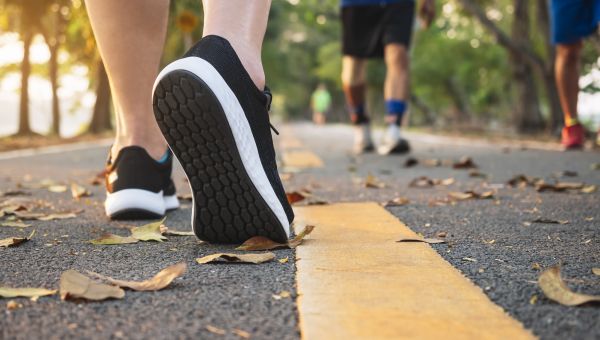
For many people, a good pair of walking shoes and some extra steps each day may go a long way, improving their mental and physical health. Experts recommend that most adults get at least 150 minutes of moderate-intensity aerobic activity, like brisk walking, each week. That’s about 30 minutes per day, spread over five days. Many people should also aim to do muscle-… Show More
For many people, a good pair of walking shoes and some extra steps each day may go a long way, improving their mental and physical health. Experts recommend that most adults get at least 150 minutes of moderate-intensity aerobic activity, like brisk walking, each week. That’s about 30 minutes per day, spread over five days. Many people should also aim to do muscle-building exercises at least twice per week.
If you don’t have the time or fitness level needed for longer workouts, you can break up your activity into short bouts of exercise. Any exercise is better than none, experts advise. Even 5- or 10-minute walks can add up over time.
If mobility is an issue for you, do as much you can to avoid being inactive. If you must adapt to a disability, work with your healthcare provider (HCP) or a trained exercise specialist to learn what is safe and appropriate for you.
Every minute of movement counts towards your weekly fitness goals and will help reduce your risk for chronic health issues like heart disease and diabetes. Learn more about the significant benefits of a simple walking routine.
Show Less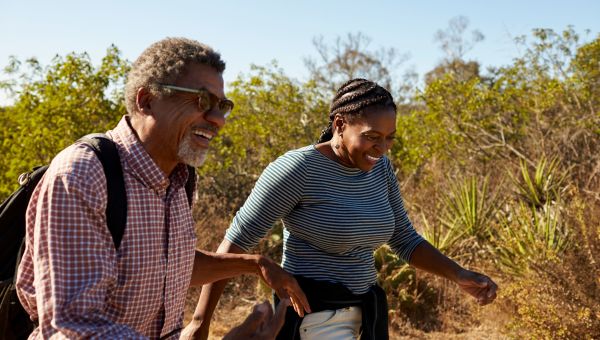
Maintain a healthy weight
Walking—and other forms of physical activity—help you burn calories. The longer or faster you walk, the more energy you’ll expend.
Optimize your walking and burn more calories with interval training. This type of workout combines short bursts of intense activity with periods of recovery, which can… Show More
Walking—and other forms of physical activity—help you burn calories. The longer or faster you walk, the more energy you’ll expend.
Optimize your walking and burn more calories with interval training. This type of workout combines short bursts of intense activity with periods of recovery, which can help increase weight loss and the fitness of your heart and lungs.
Start simple: As you’re walking, pick a spot ahead of you. Increase your pace until you reach it, then reduce your speed. Alternate between two minutes of moderately paced walking and one minute of fast walking. Continue this pattern throughout your walk.
Show Less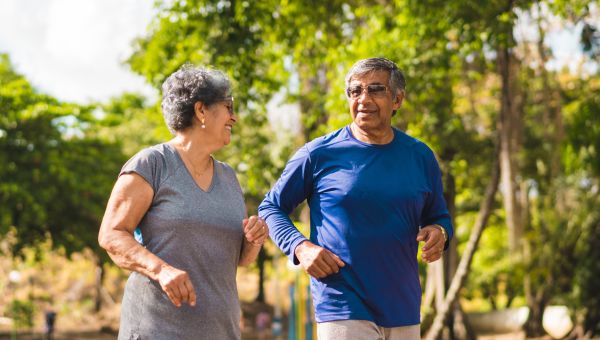
Manage or prevent diabetes
Walking can help you manage and reduce your risk of type 2 diabetes. If left unchecked, this chronic disease can damage the heart, nerves, eyes, and kidneys over time.
Being overweight is a primary risk factor for type 2 diabetes. Following a healthy diet that emphasizes fruits and vegetables,… Show More
Walking can help you manage and reduce your risk of type 2 diabetes. If left unchecked, this chronic disease can damage the heart, nerves, eyes, and kidneys over time.
Being overweight is a primary risk factor for type 2 diabetes. Following a healthy diet that emphasizes fruits and vegetables, whole grains, lean proteins, and healthy fats, while limiting saturated fat and sugar is one important way to reduce your risk for this condition.
Getting regular physical activity is another step you can take. For many people, a walking routine may be one simple way to find time for fitness every day. One 2022 study published in the journal Diabetes Care even found that, in a group of ethnically diverse women in their 70s and 80s, every 2,000 steps taken per day contributed to a 12-percent reduction in risk for developing diabetes.
Show Less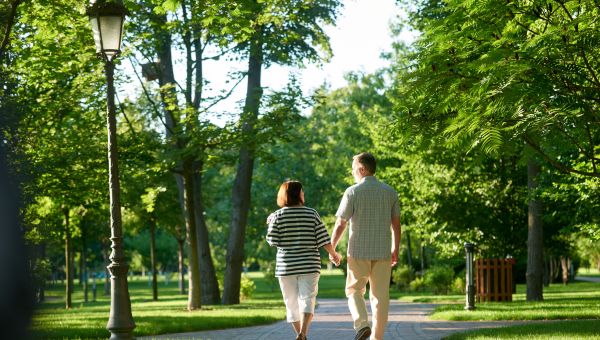
Improve your heart health
According to the American Heart Association, walking at a brisk pace for at least 150 minutes per week is linked to a lower risk of:
- High blood pressure
- High cholesterol
- Heart disease
- Stroke
- Diabetes
It also reduces the risk for depression, which in turn, can help protect the heart. That’s… Show More
According to the American Heart Association, walking at a brisk pace for at least 150 minutes per week is linked to a lower risk of:
- High blood pressure
- High cholesterol
- Heart disease
- Stroke
- Diabetes
It also reduces the risk for depression, which in turn, can help protect the heart. That’s because people with depression have a higher risk of heart disease—and vice versa.
When it comes to heart disease risk, you might be surprised to learn that the benefits of walking may be similar to those of running. So, someone who runs a mile could receive many of the same benefits if they choose to walk instead (and perhaps go a little farther).
Show Less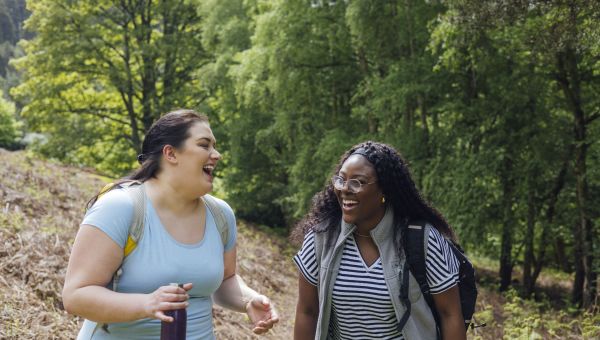
Reduce stress
Work, relationships, and money can be stressful. But walking can help ease the tension. How? Exercise releases endorphins, chemicals in the brain that ease pain and reduce stress. For some, physical activity can also promote a feeling of accomplishment, providing even more of a mood boost.
You can… Show More
Work, relationships, and money can be stressful. But walking can help ease the tension. How? Exercise releases endorphins, chemicals in the brain that ease pain and reduce stress. For some, physical activity can also promote a feeling of accomplishment, providing even more of a mood boost.
You can begin to ease stress and anxiety before your walk with a few minutes of gentle stretching. Loosen your calves, hips, and chest to increase blood flow and reduce your risk of injury.
Show Less
Support your brain function—and boost your mood
There is a growing pile of evidence supporting the brain-boosting benefits of exercise. Physical activity could help you sleep and think better and reduce your risk for dementia, including Alzheimer’s disease.
For example, a study published in 2021 in the journal Healthcare looked at the effects of… Show More
There is a growing pile of evidence supporting the brain-boosting benefits of exercise. Physical activity could help you sleep and think better and reduce your risk for dementia, including Alzheimer’s disease.
For example, a study published in 2021 in the journal Healthcare looked at the effects of walking programs on mental function and physical fitness in older adults. Researchers found that any type of walking exercise was linked to improvements in both over time.
More recent studies have also established a link between exercise and mental health, suggesting that being active can ease anxiety and reduce the risk for depression.
Show Less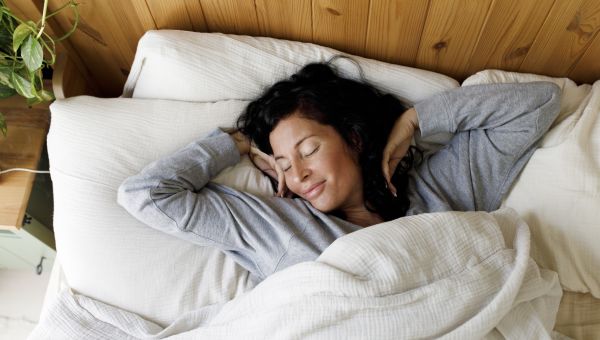
Get more restorative sleep
A brisk morning walk can set your body up for restful sleep at night. That may be partly because exercise helps your body produce melatonin, a natural sleep hormone.
Walking may be especially helpful for older adults. One 2017 review in Advances in Preventative Medicine linked exercise to… Show More
A brisk morning walk can set your body up for restful sleep at night. That may be partly because exercise helps your body produce melatonin, a natural sleep hormone.
Walking may be especially helpful for older adults. One 2017 review in Advances in Preventative Medicine linked exercise to longer, better sleep for people middle-aged and older.
Show Less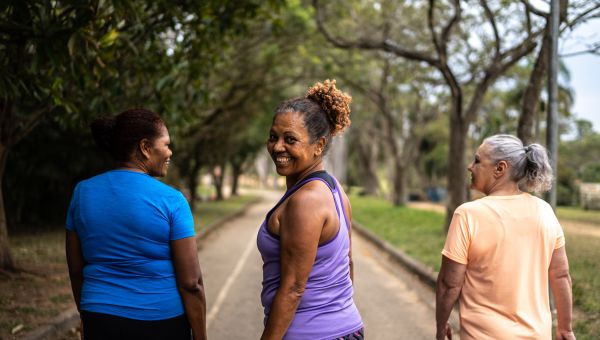
Increase your longevity
Walking could help you live longer. A November 2017 study published in the journal Circulation suggested that older adults could lengthen their life by taking a brisk walk every day. For the study, more than 17,700 women with an average age of 72 were asked to wear tracking devices when they were… Show More
Walking could help you live longer. A November 2017 study published in the journal Circulation suggested that older adults could lengthen their life by taking a brisk walk every day. For the study, more than 17,700 women with an average age of 72 were asked to wear tracking devices when they were awake. The devices measured the amount and intensity of their physical activity.
Researchers found that people who did more moderate to vigorous physical activity per day—like brisk walking—had a roughly 60 to 70 percent lower risk of death, compared to the people who were least active.
Show Less
Build a strong support system
Belonging to a group of supportive friends is one of the best things you can do for your health and wellness. Try forming a walking group with your family, friends, or neighbors. Not only can you forge bonds, but you’ll hold each other accountable in achieving your goals.
If friendly competition… Show More
Belonging to a group of supportive friends is one of the best things you can do for your health and wellness. Try forming a walking group with your family, friends, or neighbors. Not only can you forge bonds, but you’ll hold each other accountable in achieving your goals.
If friendly competition motivates your group, try a step challenge. Compete with your friends and family to see who can move the most.
Show Less
Abildso CG, Daily SM, Umstattd Meyer MR, Perry CK, Eyler A. Prevalence of Meeting Aerobic, Muscle-Strengthening, and Combined Physical Activity Guidelines During Leisure Time Among Adults, by Rural-Urban Classification and Region — United States, 2020. MMWR Morb Mortal Wkly Rep 2023;72:85–89
U.S. Department of Health and Human Services. Physical Activity Guidelines for Americans 2nd Edition.; 2018.
Centers for Disease Control and Prevention. FastStats - Exercise or Physical Activity. Page last reviewed June 11, 2021.
Su L, Fu J, Sun S, et al. Effects of HIIT and MICT on cardiovascular risk factors in adults with overweight and/or obesity: A meta-analysis. PLoS One. 2019;14(1):e0210644. Published 2019 Jan 28.
Colberg SR, Sigal RJ, Yardley JE, et al. Physical Activity/Exercise and Diabetes: A Position Statement of the American Diabetes Association. Diabetes Care. 2016;39(11):2065-2079.
National Institute of Diabetes and Digestive and Kidney Diseases. Preventing Diabetes Problems | NIDDK. Accessed August 17, 2022.
Mayo Clinic. Type 2 Diabetes - Symptoms and Causes. Published January 20, 2021.
Garduno AC, LaCroix AZ, LaMonte MJ, et al. Associations of Daily Steps and Step Intensity With Incident Diabetes in a Prospective Cohort Study of Older Women: The OPACH Study. Diabetes Care. 2022;45(2):339-347.
Barone Gibbs B, Hivert MF, Jerome GJ, et al. Physical Activity as a Critical Component of First-Line Treatment for Elevated Blood Pressure or Cholesterol: Who, What, and How?: A Scientific Statement From the American Heart Association. Hypertension. 2021;78(2):e26-e37.
Williams PT, Thompson PD. Walking versus running for hypertension, cholesterol, and diabetes mellitus risk reduction. Arteriosclerosis, Thrombosis, and Vascular Biology. 2013;33(5):1085-1091.
Mayo Clinic Staff. Exercise and stress: Get moving to manage stress. Page last reviewed on August 3, 2022.
Kang SJ, Kim BH, Lee H, Wang J. The Beneficial Effects of Cognitive Walking Program on Improving Cognitive Function and Physical Fitness in Older Adults. Healthcare (Basel). 2021;9(4):419. Published 2021 Apr 5.
Quan M, Xun P, Chen C, et al. Walking Pace and the Risk of Cognitive Decline and Dementia in Elderly Populations: A Meta-analysis of Prospective Cohort Studies. J Gerontol A Biol Sci Med Sci. 2017;72(2):266-270.
Harvard Health. 8 secrets to a good night’s sleep. Page last reviewed September 30, 2021.
Dolezal BA, Neufeld EV, Boland DM, Martin JL, Cooper CB. Interrelationship between Sleep and Exercise: A Systematic Review [published correction appears in Adv Prev Med. 2017;2017:5979510]. Adv Prev Med. 2017;2017:1364387.
More On


video
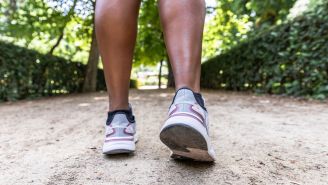
article
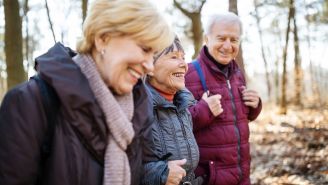
slideshow


video


video
